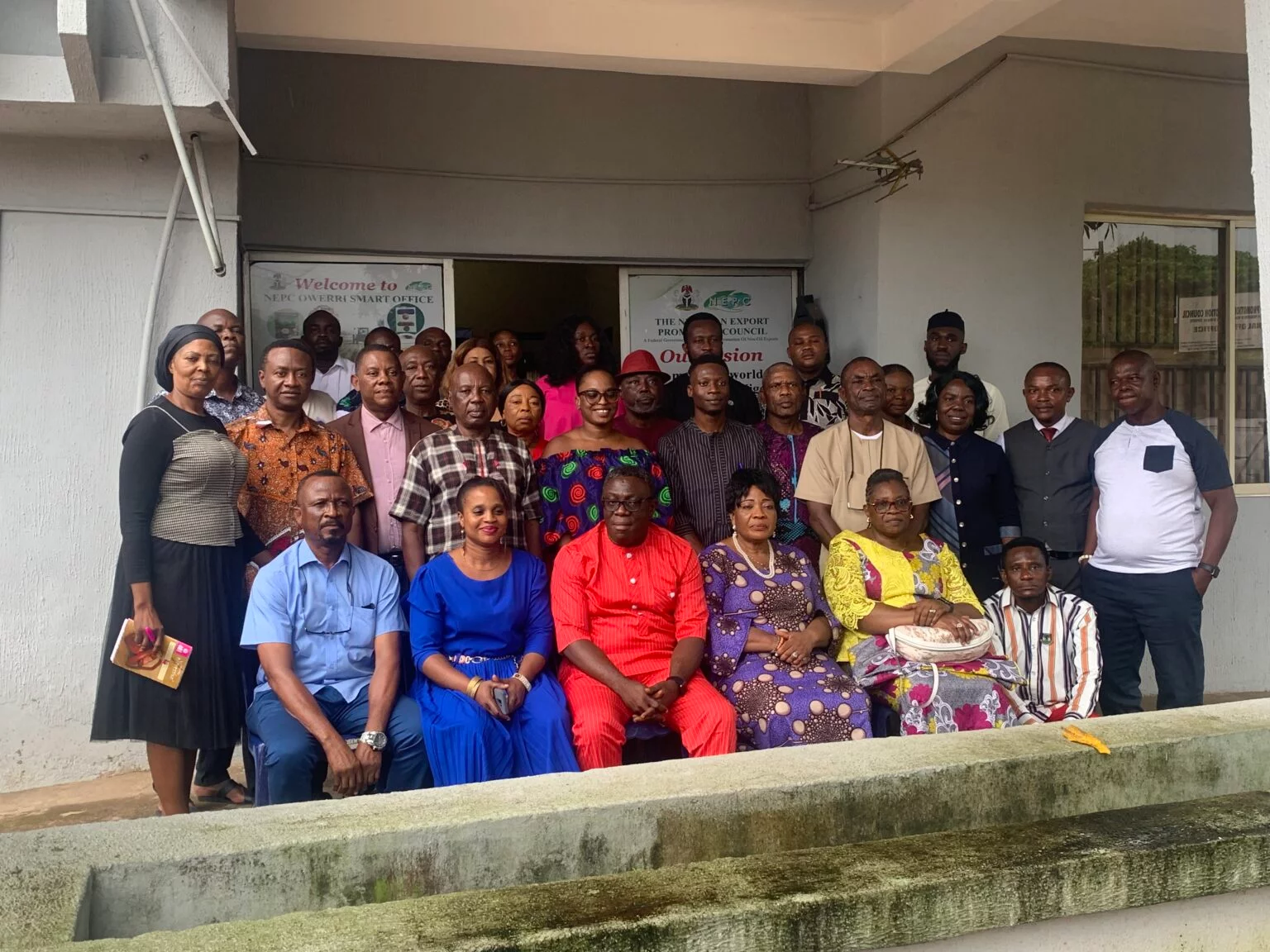Headline
Nigeria records $2.5bn non-oil exports proceeds in 6 months – NEPC

(Photo: Organisers and participants at a one-day workshop for new exporters organised by the Nigerian Export Promotion Council (NEPC) in Owerri, on Wednesday)
The Nigerian Export Promotion Council (NEPC) says the country generated 2.5 billion dollars from January to June from non-oil exports.
Executive Director of the NEPC, Dr Ezra Yakusak said this at a one-day workshop for emerging exporters, on Wednesday in Owerri.
Yakusak, represented by the NEPC’s State Coordinator in Imo, Mr Anthony Ajuruchi, said with the revenue milestone reached, the council could hope to surpass its year 2022 revenue of 4.8 billion dollars by the end of 2023.
Speaking on the theme: “New Exporters; Panacea for Non-Oil Exports Growth,” Yakusak advised newly registered exporters to learn from their experienced counterparts.
He urged successful exporters to share their experiences with new exporters so as to increase the number of players in non-oil exports business in Imo and grow the economy of the state and Nigeria at large.
“This workshop is aimed at building the morale of new exporters when they learn from existing, successful exporters so that we can increase the number of exporters in the state and Nigeria by extension.
“The more people venture into the exports business, the more revenue for the state and the more growth of Nigeria’s Gross Domestic Product (GDP) and hopefully we will surpass the gains of the previous year,” he said.
The Chief Executive Officer of Ivyl Foods, Mrs Lilian Moses-Okoro, said she had successfully exported her products to Canada, USA and the UK.
She advised the new exporters not to relent in their efforts to grow their products and to register their businesses with the NEPC so as to improve their brands and gain access to business intervention opportunities in the future.
Also, Adeola Ilechukwu of Cannif Trust Ltd., said according to statistics released by the Nigeria Catfish Association in year 2021, the country was exporting 100 metric tons of catfish annually but had gradually begun to decline.
She urged exporters to seek ways to surmount their challenges, adding that the future of Nigeria’s economy depended largely on non-oil exports.
Over 100 new exporters in Imo attended the workshop.
Headline
Fagbemi warns against obstructing EFCC from performing its lawful duty

The Minister of Justice, Lateef Fagbemi, SAN has warned against obstructing the Economic and Financial Crimes Commission (EFCC) from carrying out its lawful duty .
Fagbemi’s warning is contained in a statement in Abuja.
“This is a matter of very grave concern, it is now beyond doubt that the EFCC is given power by the law to invite any person of interest to interact with them in the course of their investigations into any matter, regardless of status.
“Therefore, the least that we can all do when invited, is not to put any obstruction in the way of EFCC, but to honourably answer their invitation.
“A situation where public officials who are themselves subject of protection by law enforcement agents will set up a stratagem of obstruction to the civil and commendable efforts of the EFCC to perform its duty is to say the least, insufferably disquieting’’.
He added that running away from the law will not resolve issues at stake but only exacerbate them.
“Nigeria has a vibrant judicial system that is capable of protecting everyone who follows the rule of law in seeking protection.
“I therefore encourage anyone who has been invited by the EFCC or any other agency to immediately toe the path of decency and civility by honouring such invitation instead of embarking on a temporising self-help and escapism.
“This can only put our country in bad light before the rest of the world’’.
He said institutions of state should be allowed to function effectively and efficiently.
“I stand for the rule of law and will promptly call EFCC, and indeed any other agency to order when there is an indication of any transgressions of the fundamental rights of any Nigerian by any of the agencies’’.
NAN reports that the EFCC had on Wednesday warned members of the public that it was a criminal offence to obstruct officers of the Commission from carrying out their lawful duties.
Section 38(2)(a(b) of the EFCC Establishment Act makes it an offence to prevent officers of the Commission from carrying out their lawful duties. Culprits risk a jail term of not less than five years.
The warning , the EFCC said, became necessary against the background of the increasing tendency by persons and groups under investigation by the Commission to take the laws into their hands by recruiting thugs to obstruct lawful operations of the EFCC.
On several occasions, the anti graft agency said, operatives of the Commission have had to exercise utmost restraint in the face of such provocation to avoid a breakdown of law and order.
Headline
Unknown Gunmen Abduct Channelstv Reporter In Port-harcourt

Some unknown gunmen have kidnapped Joshua Rogers, the ChannelsTV reporter in Port-Harcourt, the Rivers State capital.
Politics Nigeria learnt that Rogers was picked up close to his residence at Rumuosi in Port Harcourt and to an unknown destination by the gunmen around 9pm on Thursday, April 11.
The reporter was driving his official ChannelsTV branded car when the hoodlums accosted, pointed a gun at him and took him away in the same vehicle.
Rogers was said to be returning from his official assignment in Government House after a trip to Andoni for a government event when the incident happened.
Already, the gunmen were said to have contacted his wife and demanded a N30million ransom for bis release.
His cameraman confirmed the incident and appealed to his abductors to set him free unconditionally.










